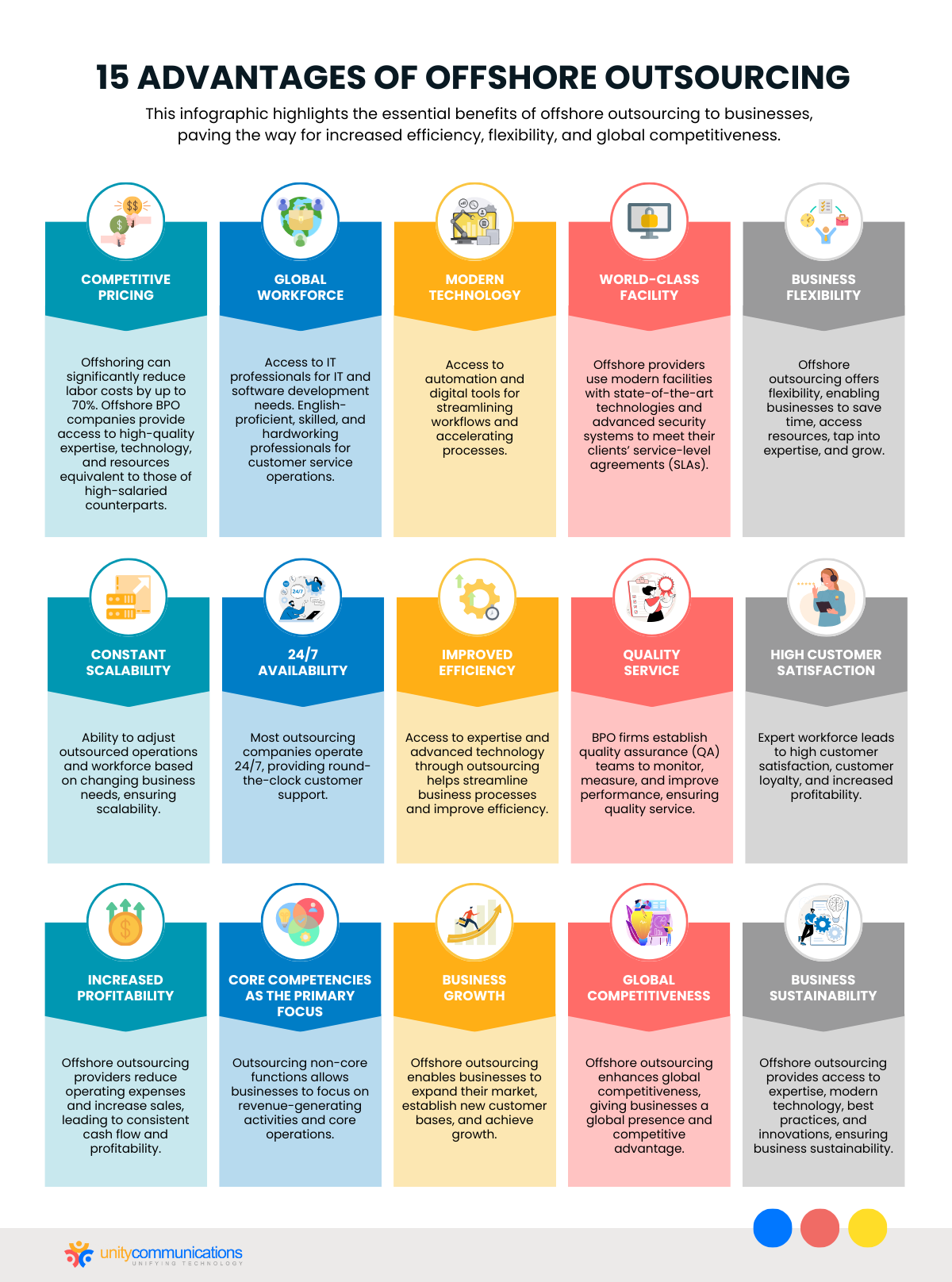IN THIS ARTICLE
Table of Contents
Outsourcing, especially offshore outsourcing, has exploded in popularity due to globalization. Many companies partner with offshoring providers in the Philippines, India, Ukraine, Malaysia, and other outsourcing destinations.
Offshore outsourcing has gained a reputation for being a practical solution to improve business processes and reduce operating costs. But what are the concrete advantages of offshore outsourcing?
This page tackles the benefits of offshore outsourcing. Keep reading to decide whether the strategy is right for your business.
Offshore Outsourcing Explained in Simple Terms

You might be familiar with “offshore outsourcing” as a buzzword in the business world. However, just as with any business strategy, there are pros and cons to outsourcing in the Philippines, India, Ukraine, and other offshoring destinations. Whether you are a startup entrepreneur or a seasoned executive, understanding this type of outsourcing is key to making informed decisions.
To begin, ask these questions: What are the advantages of offshore outsourcing? What exactly does this term mean?
Below is everything you need to know about the topic.
What Is Offshore Outsourcing?
Offshore outsourcing is when a company assigns a third-party provider in a foreign country to perform tasks usually done in-house. A perfect example is when your e-commerce business outsources customer support, data entry, and order fulfillment to business process outsourcing (BPO) firms in the Philippines.
The term “offshore” simply means that the service provider is in a country far away from its client.
This type of outsourcing is popular due to its cost-saving benefits. Companies in the U.S., Canada, and the UK outsource to BPO firms in the Philippines, India, Ukraine, and Malaysia to cut labor and operating costs.
Aside from the cost-saving benefit, businesses employ offshore outsourcing to access skilled talent, technology, and resources to improve services. All these factors translate to high customer satisfaction, increased revenues, and business growth.
Learn more about the advantages of offshore outsourcing in the next sections.
How Does It Differ from Other Outsourcing Types?
The primary difference between offshore outsourcing and other types of outsourcing is the location. Let us illustrate the difference:
- Offshore outsourcing involves partnering with a service provider in a distant country. For example, an American bank employs BPO in the Philippines to let Filipino experts handle its customer service, billing, and collections. Offshore outsourcing offers companies the most economical rates for the same service quality.
- Onshore outsourcing entails partnering with a service provider in the same country. For example, an American tech startup hires a third-party firm in the same country to handle its information technology (IT) operations. This move gives access to expertise and technology to help businesses scale and grow.
- Nearshore outsourcing is somewhat similar to offshore outsourcing, but it involves partnering with a service provider in a nearby country. For example, a large corporation in the U.S. outsources its Spanish contact center to Mexico. Not only is this strategy cost-effective, but it is favorable to your business geographically and culturally.
The Impact of Globalization on Outsourcing
The world has become a global village. Thanks to globalization, companies can do business with each other digitally, no matter the distance. The global outsourcing services market could grow from $620.38 billion in 2020 to $904.95 billion in 2027, with a 5.54% compound annual growth rate (CAGR).
Outsourcing began between the 19th and 20th centuries when businesses started to leverage other companies’ human and material resources. The manufacturing sector was the key player in capitalizing on the outsourcing industry in the 1950s. However, the term “outsourcing” only became official in 1981.
Outsourcing turned into a viable business solution in the late 1980s. This business strategy later became integral to the global economy in the 1990s. The rise of globalization, coupled with technological advances, paved the way for offshore outsourcing.
Today, businesses of all sizes prefer to outsource to other companies in foreign countries. But what is the advantage of offshore outsourcing? Business process outsourcing in the Philippines, India, Ukraine, and other offshoring destinations helps companies streamline operations and reduce expenditures.
The offshore outsourcing industry will continue to evolve and adapt to the changing business landscape. As companies become increasingly global, the demand for outsourcing services will likely increase. However, the rise of automation and artificial intelligence (AI) might also influence the industry, potentially reducing the need for certain outsourcing services.
15 Advantages of Offshore Outsourcing

The main question this article answers is: “What are the advantages of offshore outsourcing?” Its main advantage is cost reduction. Deloitte says that reducing expenses is the top outsourcing reason while focusing on core operations is the commonly perceived reason. However, there are more benefits to this strategy than you might think.
Explore the 15 key advantages of offshore outsourcing below:
1. Competitive Pricing
Cost savings are the top reason for outsourcing to the Philippines, India, and other destinations. Outsource Accelerator justified this by citing the fact that offshoring can cut up to 70% of labor costs. It can also help you save on operating expenses due to these countries’ lower cost of living.
Despite the lower labor and operating costs, offshore BPO companies let you access expertise, technology, and resources on par with their high-salaried counterparts. You can significantly reduce expenditures while improving business performance and service delivery. Such a balance gives offshoring destinations strong leverage in the outsourcing market.
2. Global Workforce
In the age of globalization, it is common for companies to do business with one another. They outsource to leverage economies of scale and utilize the talent and expertise of other companies. Thus, one advantage of offshore outsourcing is the ability to tap into the global workforce.
Let us take India and its IT professionals as an example. You can tap these experts to handle your IT and software development needs. Another example is the Philippines, with its English-proficient, skilled, and hardworking people. You can employ Filipinos for your customer service operation and other voice-related services.
3. Modern Technology
Aside from the global workforce, companies outsource to leverage modern technologies. If you lack the technological and financial resources for your operations, you can easily outsource them to a reputable service provider to address the gaps. Your BPO partner gives you access to the latest digital tools and applications.
For instance, you can hire a BPO company with access to automation and similar programs. It can help streamline your workflows, reduce manual work, and accelerate your processes. As a result, offshore outsourcing helps optimize your operations and improve your services.
4. World-Class Facility
Access to world-class facilities with state-of-the-art technologies and resources is another advantage of offshore outsourcing. Many outsourcing companies operate out of modern facilities to meet their clients’ service-level agreements (SLAs).
So what can you expect from these facilities? Aside from their excellent infrastructure with tools and equipment, you can also use their high-speed internet and advanced security systems. Thus, partnering with an outsourcing firm in a digital business environment helps ease and ensure communication with clients, regardless of distance.
5. Business Flexibility
Clutch cited that 90% of small businesses planned to outsource in 2022. They sought to adopt the strategy to save time (27%), access resources (33%), tap into expertise (26%), and grow their business (19%). Startup and small business environments are unstable, so a BPO partner can offer these companies much-needed flexibility.
Offshore outsourcing offers business flexibility as long as you create a flexible contract with your hired provider. This move allows the service provider to easily and quickly adjust to the changing business landscape, ensuring you can keep pace with competitors while meeting your business needs.
6. Constant Scalability
Scalability means adapting to changing demands while maintaining your performance or service level. Partnering with a third-party service provider can help you scale your business as needed.
Aside from flexibility, offshore outsourcing offers scalability. You can easily and quickly adjust your outsourced operations or the number of third-party workers included in your contract based on your business needs. You can also scale your business up and down during peak and off-peak seasons.
7. 24/7 Availability
Today’s businesses are going the extra mile. According to Hiver’s 2021 benchmark report, 76% of customer service teams offer support outside business hours. Nearly 35% of them provide customer support around the clock.
That said, what is the advantage of offshore outsourcing? Most outsourcing companies operate 24 hours a day, seven days a week. They have teams of professionals working on shifting schedules. That way, they can guarantee 24/7 agent availability for customer support.
8. Improved Efficiency
Offshore outsourcing gives you access to overseas providers’ expertise and advanced technology. Both factors can help streamline your business processes and improve service efficiency.
For example, a reliable BPO firm has highly skilled professionals, such as bookkeepers, accountants, and tax specialists, who can help maintain your company’s cash flow. It also uses automated software to speed up your accounting computations and financial analysis.
9. Quality Service
Aside from service efficiency, what is another advantage of offshore outsourcing? If you pick the BPO partner that best fits your business, you can guarantee the quality of the service provided. Most BPO firms establish quality assurance (QA) teams to monitor, measure, and improve performance.
Take customer service outsourcing in the Philippines, for example. QA teams track agents and audit their calls. QA specialists conduct regular coaching sessions and go as far as providing training programs. The goal is to ensure quality service and business compliance.
10. High Customer Satisfaction
Did you know customers have higher expectations than ever? About 93% of service teams agree with this statement. Customers are wiser, more critical, and more selective since they know they have many options today.
Offshore outsourcing lets you tap into an expert workforce that can serve your customers better. Customer satisfaction (CSAT) is the most critical metric in the BPO industry, especially for customer service or front-office functions. Ultimately, high customer satisfaction leads to customer loyalty and business profitability.
11. Increased Profitability
Almost every business exists to make money, doing whatever it takes to increase its bottom line. So what is an advantage of offshore outsourcing that can help with this goal? The right offshore provider can improve your business operations, efficiency, and productivity, thus boosting profits.
How does it work? While an offshore outsourcing provider helps reduce your operating expenses, its reliable workforce can also increase your sales and win new customers for your business. Thus, it ensures a consistent cash flow.
12. Core Competencies as the Primary Focus
Focusing on core operations is the most commonly perceived reason for outsourcing. This business objective is especially true for startups and small businesses looking to grow and flourish. They entrust their non-core functions to reliable service providers so that they have time to prioritize their revenue-generating activities.
For example, your e-commerce startup can delegate routine and repetitive tasks, such as data entry and inventory management, to a third-party provider. Managed operations outsourcing to the Philippines is also an option. By outsourcing these functions, you can focus on sales and marketing to promote your business and generate more revenue.
13. Business Growth
As an entrepreneur, nothing is more fulfilling than seeing your business succeed. However, you need expertise, modern technology, and abundant resources to meet this objective. Offshore outsourcing is the key to accessing these perks.
Offshore outsourcing allows you to expand your market and establish a new customer base. It helps you reach, win, and keep customers for good, allowing your business to grow.
14. Global Competitiveness
What is the advantage of offshore outsourcing? Global competitiveness. With the advent of globalization, businesses need to have a global presence to have a competitive advantage. Offshore outsourcing can help.
Let us take the Coca-Cola Company as an example. This company has capitalized on offshore outsourcing since the 1950s. Today, it has bottling partners in different parts of the world. That is why Coca-Cola has become a household name across the globe.
15. Business Sustainability
An accurate measure of success is when a business can sustain itself over the long term. However, this objective is easier said than done due to changing business landscapes, consumer behaviors, and technological advancements.
Offshore outsourcing allows you to collaborate with companies worldwide. It gives you access to expertise, modern technology, best practices, and innovations. All these factors can help you improve your business operations and adapt to changing times.
Seven Disadvantages of Offshore Outsourcing

Offshore outsourcing has become extremely popular due to its potential benefits. Now, you have learned what the advantages of offshore outsourcing are. Consider also the possible drawbacks associated with this approach. Ultimately, the key to making informed business decisions is weighing the pros and cons.
Beware of the disadvantages of offshore outsourcing below.
1. Lack of Trust and Control
Offshore outsourcing means entrusting your operations to an overseas provider. However, you might find it hard to trust a third party to handle your business functions. Or you might become overly dependent on your BPO partner since they have the workforce, technology, and resources to run your operations.
Unfortunately, this lack of trust and control can be a recipe for chaos and disaster. Consider the business solutions below:
| Solutions: | Conduct thorough research to hire a trusted provider. Develop a detailed SLA. Establish clear communication channels. Use communication and collaboration tools. Visit the provider regularly. |
2. Business Goal Misalignment
Offshore outsourcing involves two companies working together toward supposedly common goals. However, the problem starts when these parties have conflicting outsourcing objectives.
Such a goal misalignment occurs when you do not communicate and collaborate enough with your hired provider. So here are a few steps that you can take:
| Solutions: | Set common goals and orient your outsourcing partner. Establish clear and consistent communication. Embrace the use of technology for effective communication. Align incentives and rewards. Foster a culture of teamwork. |
3. Communication or Language Barriers
Offshore outsourcing involves two companies with different native languages working together. As such, expect communication and language gaps between you and your hired provider.
Without proper preparation, there might be potential misunderstandings, conflicts, and work delays due to these barriers. So, employ the following business solutions:
| Solutions: | Choose an English-proficient service provider. Ensure your BPO partner provides language training. Simplify communication protocols and develop clear guidelines. Conduct regular check-ins and meetings. Promote a culture of open communication. |
4. Cultural Differences
What is the advantage of offshore outsourcing? It allows you to tap into the expertise of a foreign workforce. However, you might inevitably encounter cultural differences that can influence communication styles and business practices.
When you do not address these issues, such differences can lead to misunderstandings and conflict. Implement the following business solutions:
| Solutions: | Conduct cultural sensitivity training. Develop cultural awareness. Establish clear communication channels. Build and maintain good working relationships. Promote a culture of accepting and respecting differences. |
5. Privacy and Security Risks
Offshore outsourcing entails entrusting your business data and customer information to a third party. Unfortunately, a lack of data privacy and network security can expose them to physical and cyberattacks.
Data breaches, identity theft, and unauthorized access can lead to financial losses, legal implications, and damaged reputations. Consider the best practices below.
| Solutions: | Choose a reputable outsourcing service provider. Ensure it has data privacy and network security measures. Conduct regular audits and assessments. Train staff on privacy and security best practices. Maintain strong oversight and governance. |
6. Extra and Unexpected Costs
Outsourcing helps you save money in the long term since you need not invest in people, infrastructure, and technology. However, you might encounter hidden costs when you do not perform due diligence and thoroughly review proposals.
To avoid hidden expenses and benefit from cost savings, follow the steps below:
| Solutions: | Conduct due diligence before selecting an outsourcing provider. Define and communicate the work scope. Conduct a thorough cost analysis. Establish transparent pricing models. Monitor the outsourcing provider’s performance. |
7. Potential Disruptions
What is the advantage of offshore outsourcing? It lets you access an expert workforce, advanced technology, and available resources. However, you might still encounter possible disruptions for various reasons.
Some disruptions include natural disasters, political instabilities, and technical issues, affecting work quality, efficiency, and productivity. So, implement the following:
| Solutions: | Set a contingency plan in place. Diversify your provider’s locations. Maintain an in-house team. Use technology to facilitate remote work. Build solid relationships with providers. |
How to Get Started with Offshore Outsourcing

You have learned about the advantages of offshore outsourcing. You have also explored its potential risks and how to address them. Now, it is time to get started with the strategy.
Know that offshore outsourcing requires careful planning, research, and execution. Here are some crucial steps to follow:
- Audit business operations. The goal is to identify your processes’ problems, inefficiencies, and bottlenecks. Afterward, you can determine outsourcing tasks and lay out your requirements.
- Research potential providers. Search online to find prospective BPO firms that offer the outsourcing services you need. You can also ask for referrals from other businesses and professionals.
- Hire the right provider. To pick the best fit, screen your prospects based on reputation, credentials, and outsourcing track record. Specifically, factor in their workforce, technology, facility, resources, and pricing model.
- Create an outsourcing contract. The SLA outlines the terms and conditions of your outsourcing engagement, including the key performance indicators (KPIs) to hit.
- Launch the outsourcing operation. Assist your hired provider in setting up its operation. Perform a pilot run before the launch to ensure everything goes as smoothly as possible.
- Track performance and progress. When your outsourcing operation is up and running, ensure you monitor your provider’s performance. Track your outsourcing progress to see if you are heading in the right direction.
- Optimize the outsourcing operation. Through regular audits, you can see areas for improvement in your operation. Take steps toward optimizing your process, such as adjusting KPIs, modifying SLAs, offering training programs, and investing in new technologies.
The Bottom Line
To cap this article, let us return to the main question: what is the advantage of offshore outsourcing? It is a practical solution for improving operations while saving costs. However, it offers several other benefits, such as those discussed above.
When outsourcing, weigh its pros and cons. Take advantage of its many benefits, but prepare for some possible risks. More importantly, consider our solutions and best practices to hire the right outsourcing partner for your business.
Whether you run a startup, small business, or large corporation, consider exploring offshore outsourcing to boost your competitive advantage in today’s global market. Unity Communications can be your best outsourcing partner with its talented workforce and modern technology. Let’s connect to learn more about our services!





